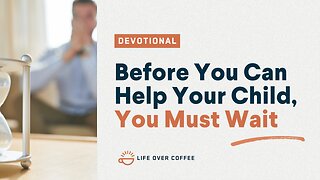Premium Only Content

Consider This When Making the Vaccine Decision
I have talked about taking or rejecting the vaccine based on a conscience issue; you may watch that video if you wish: https://bit.ly/3vXyjwo
In this video, I want to make a case for the considerations of the comorbidity problem. Comorbidity is one or more physical issues that can exacerbate a person with COVID. For example, a 60-year person with no comorbidity will have a better chance of overcoming COVID than a person of the same age with multiple comorbidities.
Life Over Coffee exists to provide life-changing resources that equip Christians.
Helpful Links
Would you please help keep our resources free by donating here: http://bit.ly/2ggwJTF.
Learn more about our training here: http://bit.ly/2u2oD25
If you would like to talk to us, go here: http://bit.ly/2ieukJz
Video produced by H.M.G.T.: https://bit.ly/2y9szpo
Connect with Us:
Website: https://bit.ly/3yNZc76
Facebook: https://bit.ly/3wGkWQp
Rumble: https://bit.ly/3CotmPt
Twitter: https://bit.ly/2SF1BQE
Instagram: http://bit.ly/2He98il
TikTok: https://bit.ly/3i1moZI
YouTube: https://bit.ly/3i0UmND
Why is the comorbidity question vital when thinking about taking the vaccine? Because it matters. Some people are at more risk than others. I struggle when someone asks me whether I have the vaccine because a person could decide based on how I made mine. But we are different people. I have no comorbidities.
It's never apples to apples, but always apples to oranges, and the perplexing them to me is how few folks talk about the comorbidity problem. There are several considerations to make the vax decision, e.g., conscience, mandates, natural immunity, health-risk issues, and comorbidity.
1. Older adults are more likely to get severely ill from COVID-19. More than 81% of COVID-19 deaths occur in people over age 65. The number of deaths among people over age 65 is 80 times higher than the number of deaths among people aged 18-29.
2. Cancer
3. Chronic kidney disease
4. Chronic liver disease
5. Chronic lung diseases
6. Dementia or other neurological conditions
7. Diabetes (type 1 or type 2)
8. Down syndrome
9. Heart conditions
10. HIV infection
11. Immunocompromised state (weakened immune system)
12. Overweight and obesity: In the United States, 36.5 percent of adults are obese. Another 32.5 percent of American adults are overweight. In all, more than two-thirds of adults in the United States are overweight or obese.
13. Pregnancy
14. Sickle cell disease or thalassemia
15. Smoking, current or former
16. Solid organ or blood stem cell transplant
17. Stroke or cerebrovascular disease, which affects blood flow to the brain
18. Substance use disorders
19. Tuberculosis
A person has control over some of these comorbidities, and I recommend that if you can change your health, that is your best course of action. If you do not eat healthily or workout weekly or have a vibrant spiritual life, please consider making those changes.
-
 4:26
4:26
Life Over Coffee
6 days agoParenting Day 6: Before You Can Help Your Child, You Must Wait
272 -
 1:19:18
1:19:18
Dr. Drew
4 hours agoDr. Peter McCullough: RFK Jr. Faces Senate Hearing Circus, As 81,000 Doctors & Experts Publish New Demand For COVID-19 Vaccine Recall – Ask Dr. Drew
34.2K4 -
 1:02:30
1:02:30
In The Litter Box w/ Jewels & Catturd
22 hours agoConfirm Kash & Tulsi! | In the Litter Box w/ Jewels & Catturd – Ep. 731 – 1/30/2025
42.5K17 -
 1:54:36
1:54:36
PudgeTV
5 hours ago🟡 Practical Pudge Ep 52 | Sticker Mule CEO & Future NY Congressman - Anthony Constantino
9.39K -
 LIVE
LIVE
Major League Fishing
1 day agoLIVE! - Bass Pro Tour: Stage 1 - Day 1
244 watching -
 1:45:07
1:45:07
The Quartering
4 hours agoWokeness Leads To PlaneCrash, Kash & Tulsi Confirmations, Daily Wire Blasted & More
110K20 -
 5:56:13
5:56:13
Right Side Broadcasting Network
23 hours agoLIVE REPLAY: Kash Patel Testifies at Senate Confirmation Hearing for FBI Director - 1/30/25
469K311 -
 1:55:33
1:55:33
The Charlie Kirk Show
4 hours agoThe Biggest Confirmation Day Of All + DC Crash Aftermath | 1.30.2025
128K69 -
 LIVE
LIVE
Mally_Mouse
3 hours agoMunchies with Mally! -- Homemade Brownies & Snickerdoodle Cookies!
114 watching -
 58:10
58:10
The Criminal Connection Podcast
7 hours ago $0.08 earnedTerry Turbo: THE KING OF CLUBS! (One Nation, 90's Rave Scene Documentary)
7.68K1